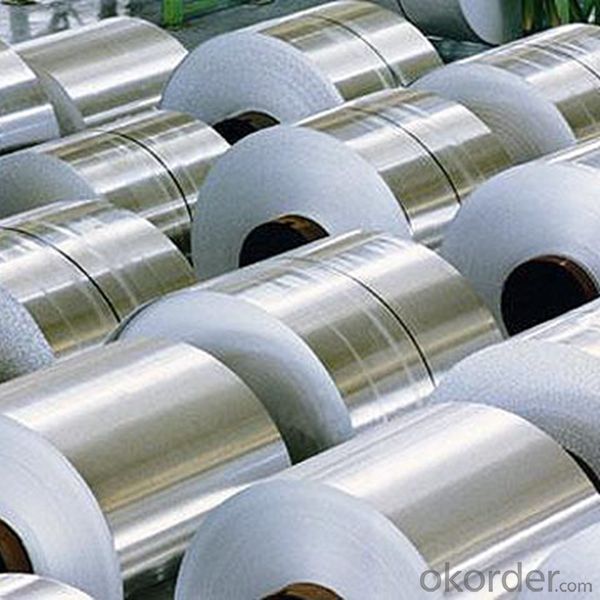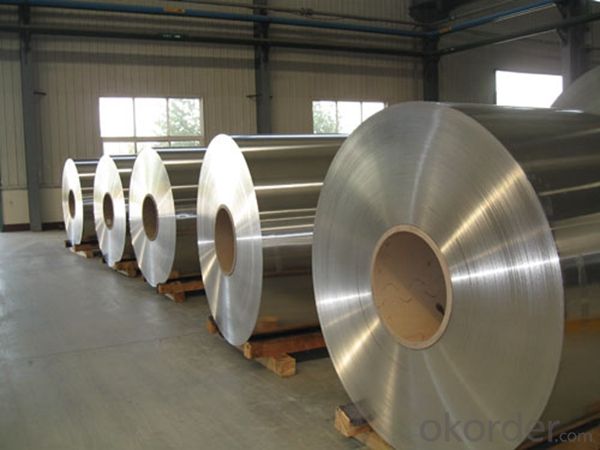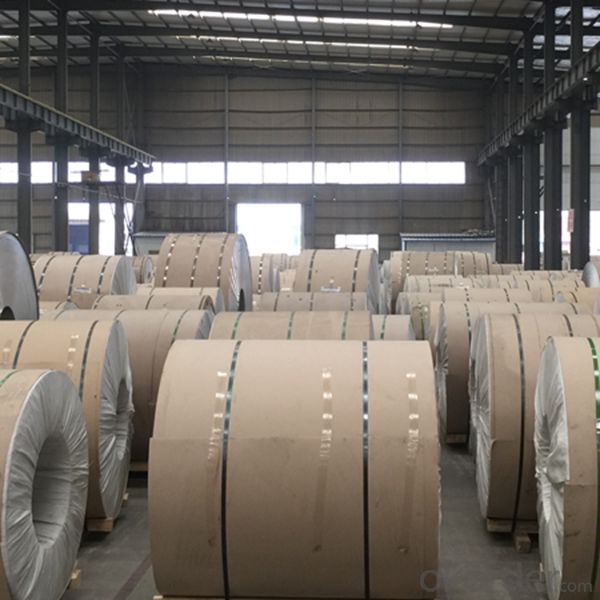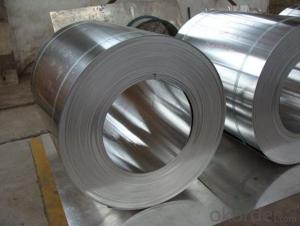Mill Finish Aluminium Coil 1050 1060 1100 for Building Decoration
- Loading Port:
- Shanghai
- Payment Terms:
- TT OR LC
- Min Order Qty:
- 5 m.t.
- Supply Capability:
- 10000 m.t./month
OKorder Service Pledge
OKorder Financial Service
You Might Also Like
Item specifice
1. Specification of Mill Finish Aluminium Coil 1050 1060 1100 for Building Decoration
Name | Aluminum Coil |
Brand | CNBM |
Alloy | 1100H-18, 3003-H24,3003-H26,3005-H26,8011,3004,3105,5005,etc. |
Thickness | 0.1~1.5mm |
Width | <2000mm< span=""> |
MOQ | 1 MT |
Coating finish | Brushed, drawing, embossed, printing |
Color | As to code RAL |
Surface | Embossed,Mill Finish,Coated,Brushed |
Gloss | 10-90%(EN ISO-2813:1994) |
Total coating thick | PVDF27 ~35micron |
Polyester18~27micron(EN ISO-2360:1995) | |
Coating hardness | 2H |
Adhesion | 5B (EN ISO-2409:1994) |
Impact resistance | No cracking and peeling (A.S.T.M D2794-1993) |
Flexibility (T-bend) | 0T- 2T |
MEK resistance | 100 |
Certification | ISO9001:2000, CE, SGS |
Coil's standard diameter | 1100mm |
Inner Diameter | 405mm/505mm |
Coil's standard weight | 1MT - 2MT |
2. Application of Mill Finish Aluminium Coil 1050 1060 1100 for Building Decoration
(1).Interior: wall cladding, ceilings, bathrooms, kitchens and balconies, shutters, doors...
(2).Exterior: wall cladding, facades, roofing, canopies, tunnels,column covers , renovations...
(3).Advertisement: display platforms, signboards, fascia, shop fronts...
3. Feature of Mill Finish Aluminium Coil 1050 1060 1100 for Building Decoration
*Such coil is specially designed to replace aluminum ingot, due to the high export tax of aluminum ingot, the coil has better price than ingot.
*This type of coil can fit customer's remelting furnace just like ingot, no need to make any change to the production line that was previously used for ingot. The standard coil size and weight is very suitable for the feed gate of furnace.
*This type of coil causes less material wastage than ingot when remelted.
*Our coil is made directly from ore, no need to go though the ingot making process, quality is much better than other suppliers who use ingot scrap to make coil.
Be free from Oil Stain, Dent, Inclusion, Scratches, Stain, Oxide Dicoloration, Breaks, Corrosion, Roll Marks, Dirt Streaks and other defect which will interfere with use
4. Certificate:
SGS and ROHS(if client request, paid by client), MTC(plant provided), Certificate of Origin(FORM A, FORM E, CO), Bureau Veritas and SGS (if client request, paid by client), CIQS certificate
5. Image of Mill Finish Aluminium Coil 1050 1060 1100 for Building Decoration



6. Package and shipping of Mill Finish Aluminium Coil 1050 1060 1100 for Building Decoration
eye to wall
eye to the wall
with wood pallet (wooded case also available)
7. FAQ
1) What is the delivery time?
Dpends on actual order, around 20 to 35 days
2)What is the QC system:
We have QC staff of 20 persons and advanced equipment, each production is with MTC traced from Aluminum ingot lot.
3) What market do you mainly sell to?
Australia, America, Asia, Middle East, Western Europe, Africa etc
- Q:What are the different types of aluminum coils available in the market?
- In the market, one can find various types of aluminum coils, each possessing its own distinct characteristics and applications. 1. Basic Aluminum Coils: These coils are simple and commonly used for general purposes. They have a smooth surface and find applications in industries like construction, automotive, and packaging. 2. Aluminum Coils with Enhanced Aesthetic Appeal: These coils are coated with paint or other finishes to improve their visual appeal and provide extra protection against corrosion. They are widely used in the manufacturing of building facades, signage, and decorative items. 3. Textured Aluminum Coils: These coils have a textured or patterned surface, which gives them a decorative appearance and makes them slip-resistant. They are often utilized in applications where both aesthetics and functionality are important, such as flooring, staircases, and decorative panels. 4. Anodized Aluminum Coils: Through the anodizing process, a protective oxide layer is formed on the surface of these coils. This enhances their resistance to corrosion and makes them suitable for outdoor applications, including architectural elements, electronic components, and the aerospace industry. 5. Pre-painted Aluminum Coils: These coils come with a pre-applied paint coating, eliminating the need for additional painting or finishing. They are frequently used in industries that require high-quality, durable, and consistently colored products, such as automotive, appliances, and electronics. 6. Aluminum Coils for Heat Transfer: Specifically designed for heat transfer purposes in air conditioning and refrigeration systems, these coils have high thermal conductivity. They are often made from alloy grades that offer excellent corrosion resistance in harsh environments. Considering the specific requirements and intended use of the aluminum coil is crucial before making a purchase. This ensures that the appropriate coil type is selected for the desired application, optimizing performance and longevity.
- Q:if air goes throught a lot of tiny aluminum will cause cooling? Why am i asking this because when you see inside the computer desktop has heatsink fan, and some of the heatsink are made by aluminum.
- aluminum is a full conductive metal that gathers the heat from the other sides of the computer and when the wind passes the aluminum, It will cool down and gather the heat again and again.That's why some computers have aluminum made heat sink.Also some of them have copper heat sink that is better conductor than aluminum
- Q:What are the different alloy grades used in aluminum coils?
- There are several different alloy grades commonly used in aluminum coils, including 3003, 5052, 6061, and 7075. These grades have varying levels of strength, corrosion resistance, and weldability, making them suitable for different applications in industries such as automotive, construction, and aerospace.
- Q:also, can aluminum become oxidized when secured down with metal nuts and bolts vice stainless steel nuts and bolts?
- The oxidation is the white powdery stuff on the metal. It can be cleaned with aluminum cleaner. Exposure to the weather can cause the rust, electric current. I advise using a sealer on the metal to keep it clean.
- Q:i have received an aluminium cooker,it's in good condition but the outside is discoloured by oil splatters.The body is round ,i have used baking soda+vineger( mix with water and boil for an hour) to clean the insides,it came off clean but outside i have no clue. used a lot of elbow grease,my hands are paining now..i have this thing for gleaming utensils ,any suggestions with homemade things,don't want to buy anything
- To clean discolored aluminum you can also heat 2 teaspoons cream of tarter per quart of water. It would be best to let the cooker soak in the mixture, but that might be difficult depending on the size of your cooker. Lemon juice or lime juice should also help because they have citric acid. You could cut a lemon in half and rub the halves on the cooker, then try scrubbing with something that has some texture to it (rough sponge or steel wool). The try the vinegar or cream of tarter mixture again. Whatever you use, don't try bleach as it is highly alkaline and dissolves aluminum. This leaves copper deposits can make it turn black.
- Q:What are the different coil lengths available for aluminum coils?
- There are several different coil lengths available for aluminum coils, depending on the specific application and requirements. Generally, aluminum coils can be found in lengths ranging from a few feet to several hundred feet. The most common coil lengths for aluminum coils used in various industries, such as HVAC, automotive, and construction, are typically 50 feet, 100 feet, and 250 feet. However, it's important to note that custom coil lengths can also be manufactured based on the specific needs of the customer. These custom lengths can vary depending on factors like coil thickness, width, and intended use. Ultimately, the available coil lengths for aluminum coils are flexible and can be tailored to suit the needs of different industries and applications.
- Q:How are aluminum coils used in the production of cans and containers?
- Aluminum coils are a crucial component in the production of cans and containers. These coils are typically made by continuously casting molten aluminum into thin sheets. Once these sheets are cooled and solidified, they are rolled into coils, which are then used in various manufacturing processes. The first step in using aluminum coils for cans and containers is the process of blanking. In this step, a blanking press cuts the coil into individual circular blanks, which will eventually become the bottom and the lid of the can. These blanks are carefully cut to the required size and shape, ensuring precision and uniformity. Next, the blanks are transferred to a cupping press, where they are placed between a set of dies. The press applies high pressure, causing the blank to take the shape of a cup. This cup will eventually serve as the body of the can or container. The cup is then transferred to a redraw press, where it undergoes a series of operations to improve its shape and dimensions. This process helps to achieve the desired thickness and height of the can or container. The redraw press also ensures that the cup maintains its structural integrity and can withstand the rigors of storage and transportation. After the cup has been redrawn, it undergoes a trimming process to remove any excess material and achieve the final shape. This step ensures that the can or container has a clean and smooth edge, ready for further processing. Once the cups have been trimmed, they are transferred to a base-coating station. Here, a thin layer of protective coating is applied to the inside and outside surfaces of the cups. This coating helps to prevent corrosion and ensures that the contents of the can or container remain fresh and uncontaminated. Finally, the coated cups are passed through a necking press, where the top portion of the cup is formed into a narrower neck. This neck is crucial for attaching the lid or cap to the can or container, providing a secure seal. In summary, aluminum coils play a vital role in the production of cans and containers. They are shaped into blanks, cups, and eventually transformed into the final product through various manufacturing processes. These coils ensure the durability, functionality, and integrity of cans and containers, making them suitable for a wide range of applications in industries such as food and beverages, pharmaceuticals, and cosmetics.
- Q:How are aluminum coils different from other types of metal coils?
- Aluminum coils differ from other types of metal coils in several ways. Firstly, aluminum is a lightweight metal, making aluminum coils much lighter compared to coils made from other metals such as steel or copper. This lightweight property of aluminum makes it a popular choice for various industries where weight is a critical factor, such as aerospace and automotive industries. Secondly, aluminum coils have excellent corrosion resistance. Unlike other metals, aluminum forms a protective oxide layer on its surface when exposed to air, preventing further corrosion. This resistance to corrosion makes aluminum coils suitable for applications in humid and corrosive environments, such as marine or coastal areas. Additionally, aluminum coils possess high thermal conductivity. This means that aluminum can efficiently conduct heat, making it an ideal material for heat transfer applications like HVAC systems, refrigeration units, and radiators. The high thermal conductivity of aluminum coils allows for more efficient cooling or heating processes. Furthermore, aluminum is highly malleable and ductile, which means it can be easily shaped and formed without losing its structural integrity. This malleability makes aluminum coils flexible and versatile, allowing them to be manufactured into various shapes and sizes to meet specific industry requirements. Lastly, aluminum is a highly sustainable and recyclable material. It can be recycled repeatedly without losing its quality or performance, making aluminum coils an environmentally friendly choice. This recyclability factor contributes to reducing the environmental impact and promoting a circular economy. In summary, aluminum coils stand out from other metal coils due to their lightweight, corrosion resistance, high thermal conductivity, malleability, and recyclability. These unique properties make aluminum coils a preferred choice for a wide range of applications across different industries.
- Q:Can aluminum coils be used in automotive applications?
- Yes, aluminum coils can be used in automotive applications. Aluminum is a lightweight and corrosion-resistant material, making it a suitable choice for various automotive components, including coils. Its high thermal conductivity also allows for efficient heat transfer, making it beneficial for applications such as radiators and air conditioning systems.
- Q:Can aluminum coils be used for signage and display applications?
- Yes, aluminum coils can be used for signage and display applications. Aluminum is a versatile and lightweight material that is widely used in the signage industry. Aluminum coils can be easily formed into various shapes and sizes, making them suitable for a variety of signage and display applications. Aluminum coils are commonly used for outdoor signs, such as billboards, building signs, and traffic signs, due to their excellent weather resistance and durability. They can withstand harsh weather conditions, including rain, snow, and UV exposure, without rusting or fading. This makes them a reliable choice for long-lasting signage. Additionally, aluminum coils can be coated with a variety of finishes, such as paint or powder coating, to enhance their appearance and provide additional protection against corrosion. This allows for customization and branding options, making aluminum coils suitable for both functional and decorative signage. In terms of display applications, aluminum coils can be used to create exhibition stands, trade show displays, retail displays, and various other promotional materials. Their lightweight nature makes them easy to transport, assemble, and disassemble, which is beneficial for portable displays. Furthermore, aluminum coils can be easily printed on or laminated, allowing for the incorporation of graphics and visuals to attract attention and convey messages effectively. Overall, aluminum coils are a versatile and durable material that can be used for a wide range of signage and display applications. Their weather resistance, customizable finishes, and lightweight properties make them a popular choice in the industry.
1. Manufacturer Overview |
|
|---|---|
| Location | |
| Year Established | |
| Annual Output Value | |
| Main Markets | |
| Company Certifications | |
2. Manufacturer Certificates |
|
|---|---|
| a) Certification Name | |
| Range | |
| Reference | |
| Validity Period | |
3. Manufacturer Capability |
|
|---|---|
| a)Trade Capacity | |
| Nearest Port | |
| Export Percentage | |
| No.of Employees in Trade Department | |
| Language Spoken: | |
| b)Factory Information | |
| Factory Size: | |
| No. of Production Lines | |
| Contract Manufacturing | |
| Product Price Range | |
Send your message to us
Mill Finish Aluminium Coil 1050 1060 1100 for Building Decoration
- Loading Port:
- Shanghai
- Payment Terms:
- TT OR LC
- Min Order Qty:
- 5 m.t.
- Supply Capability:
- 10000 m.t./month
OKorder Service Pledge
OKorder Financial Service
Similar products
New products
Hot products
Related keywords





























